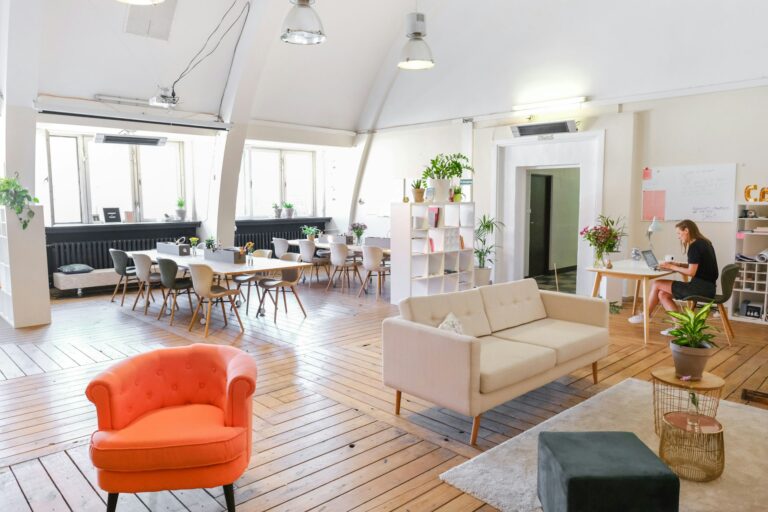In city centers, many commercial premises are closing down. Shops, offices, and practices are standing empty, while demand for furnished accommodation is skyrocketing. For property owners, the idea of converting their commercial premises into Airbnb rentals is appealing: it breathes new life into unoccupied properties while generating regular income.
But this is not a project that can be improvised. In France, it is subject to specific legal and urban planning rules: change of use, municipal authorization, technical compliance, appropriate taxation… all steps that must be followed in the right order.
This guide from Lavie Maison helps you understand how to legally convert commercial premises into furnished tourist accommodation, what steps to take, and how to make it a profitable venture without any legal missteps.

The answer is yes… but not without conditions. The law strictly regulates this type of conversion in order to preserve the balance between housing and economic activities.
Each property has a defined use: commercial, professional, or residential. Switching from one to another requires authorization for a change of use, as provided for in the Building and Housing Code (Article L.631-7). In other words, commercial premises can only be converted into housing—and rented out on Airbnb—with the approval of the local council.
This rule prevents city centers from losing their shops to tourist activities.
In Paris, converting commercial premises into furnished tourist accommodation requires authorization with compensation: for every square meter converted, equivalent accommodation must be created elsewhere. Other large cities such as Lyon, Bordeaux, and Nice require prior authorization or quotas. In smaller towns, the procedure is often more flexible, with a simple declaration sufficient.
Some condominium regulations prohibit the conversion of commercial premises into residential properties, particularly in buildings used exclusively for professional or bourgeois purposes. Properties located in protected areas also require the approval of the French architectural review board (Architectes des Bâtiments de France). Finally, a commercial lease may prohibit any change of use. Before investing, it is therefore necessary to check the legal compatibility of the property.
Converting commercial premises into furnished accommodation involves a specific administrative process: authorization for change of use, change of purpose, and declaration of tourist accommodation.
Mandatory in all cities with more than 200,000 inhabitants, it can be obtained from the town hall. The application includes plans, a description of the property and, in Paris, a compensation proposal. Without this authorization, renting is illegal and subject to heavy fines.
This process is governed by the Urban Planning Code. Premises classified as “commercial” must be reclassified as “residential.” Depending on the nature of the work, either a preliminary declaration or a building permit must be submitted. An architect can help ensure that the project complies with regulations.
Once the conversion is complete, the property must be registered as a furnished tourist accommodation in order to obtain a registration number. This number is mandatory on platforms such as Airbnb and Booking.com. It allows the local council to monitor short-term rentals and collect tourist tax.
An Airbnb accommodation must meet the same standards of comfort and safety as a conventional home.
The accommodation must offer a minimum of 9 m² of living space, a ceiling height of 2.20 m, an opening to the outside, and compliant electrical installations. Basements without windows are excluded.
Ventilation, natural lighting, ventilation, and fire-resistant materials are mandatory. Former commercial premises often require complete upgrading to meet standards.
Creation of a kitchen, bathroom, insulation, water and electricity networks, etc. Beyond the legal requirements, the challenge is to provide a coherent, bright, and comfortable space in keeping with the spirit of Lavie Maison.
In Paris, a change of use with compensation is unavoidable. Each square meter converted must be compensated for by the creation of an equivalent dwelling. The authorization is nominative and linked to the property.
Lyon, Bordeaux, Nice, Annecy… several cities limit seasonal rentals to 120 days/year for primary residences and impose quotas for furnished tourist accommodations.
Renting without authorization can result in a fine of up to €100,000 per property. City halls, particularly in Paris, carry out regular checks.
A well-located commercial property can generate 30 to 50% more income than a long-term rental. Travelers appreciate unique and well-appointed properties.
Rental income is classified as industrial and commercial income (BIC).
Micro-BIC: 50% allowance (or 71% if the property is listed).
LMNP (actual regime): deduction of actual expenses (work, interest, furnishings).
Allow for €1,000 to €2,500 per square meter depending on the condition of the property. Profitability depends on location, compliance, and rental management.
They guarantee that the project complies with regulations, optimize the plans, and ensure that standards are met. The architect ensures the feasibility and aesthetic quality of the property, while the project manager supervises the work to deliver a compliant, functional, and harmonious property.
A specialized lawyer secures the legal procedures and verifies the condominium rules. The notary is involved in overseeing the resale or easements.
A concierge service such as Lavie Maison manages the day-to-day logistics: reception, cleaning, pricing, and guest satisfaction. This is the key to sustainable returns and a premium customer experience.
The conversion of commercial premises into Airbnb accommodation involves urban planning, legal issues, and investment. When well prepared, it can add value to unused property and generate sustainable income.
The secret to a successful project lies in three points: complying with the law, designing a compliant space, and entrusting management to experts. It is this combination of rigor and elegance that Lavie Maison champions, providing a high-end, seamless, and responsible rental service.